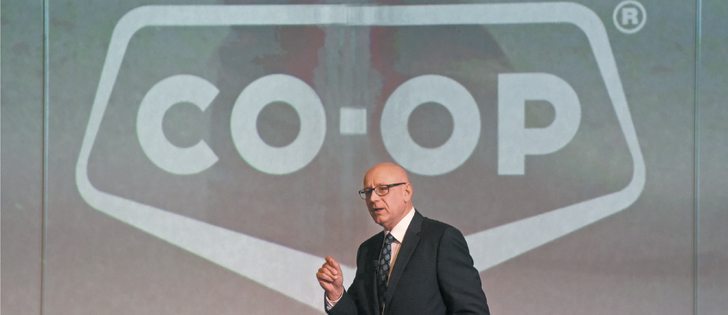Federated Co-operatives Ltd. did not go unscathed during a year that saw changing market conditions and volatile commodity prices in Canada.
The main problem was seen at the Co-op Refinery Complex, where total energy earnings dropped 24.7 percent, or $1.95 billion, from the previous year.
The decline was blamed on falling crude oil prices, reduced diesel margins, reduced heavy oil differentials, losses due to foreign ex-change rates and depreciation of the cost of the Section V expansion and revamps.
“Deflation in the energy prices out there drove our sales number down, but at the same time our actual volume of products moved, including petroleum, went up,” chief executive officer Scott Banda told more than 300 delegates at FCL’s 87th annual general meeting in Saskatoon Feb. 29.
Read Also

Saskatchewan throne speech promises strong economy
Saskatchewan’s legislative agenda for the coming year will focus on meeting the challenges of new world trading relationships, said the speech from the throne.
However, he said sales and earnings grew for most business units: crop supplies, feed, food and home and building supplies.
“Although the sales numbers were down substantially, we gained market share and we grew over $200 million worth within our other business units.”
FCL recorded revenue of $9.1 billion for the fiscal year ending Oct. 31, which was down 16 percent from $10.8 billion the previous year.
Net earnings for 2015 were $539 million compared to $656 million in 2014. The company allocated $375 million to the retail members at the end of the year.
“As tough as our year was, that is still a very significant number that we should all be proud of, that we were able to generate that economic benefit back to the members of this co-operative,” he said.
“Very solid financial performance in a very volatile market.”
Banda said FCL will continue to invest in sustainable growth while encouraging retail stores to diversify and reduce their reliance on the energy sector.
“We’ve invested significant assets into our food business, our crop supply business, feed business and home and building supplies,” he said.
“Those have grown and expect them to continue, but they will be challenged, depending on specific markets.”
The company created a new fertilizer department last year to provide retail stores with a better way to pool purchasing power and source fertilizer.
“That’s going to help grow our presence there and we believe that complete offering (ag equipment, seed, crop supplies) that we can offer producers, not only in the ag space but coupling fuel with that puts us in a position to compete very well,” he said.
FCL also started investing in an annual bond issuance last year, which Banda said will give it access to third party analysis.
“We’re very, very pleased compared to our competitors on where we stacked up, which was at best equal, or a higher spot with a BBB+,” he said.
“That was external validation of the strength of our organization.”
Banda said markets and commodity pricing will continue to be challenging this year, particularly in the energy business.
However, he credits the co-operative model and member engagement as a key competitive advantage during the economic slow down.
“The co-operative model of member engagement is a strength that other business models lack and they spend considerable time, considerable resources in trying to replicate,” he said.
“That’s something we never want to forget.”
Contact william.dekay@producer.com
















